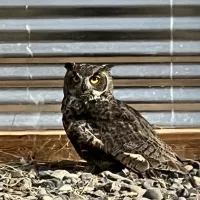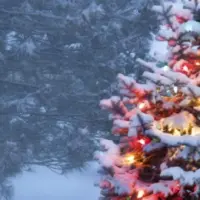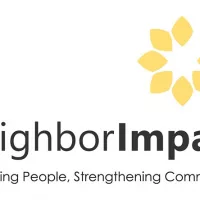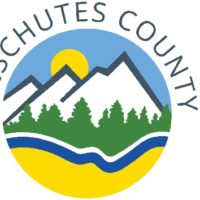
Think Wild, Central Oregon’s wildlife hospital, is preparing to release a rehabilitated Great Horned Owl who has been in their care since August 27. The juvenile owl was rescued from barbed wire fencing near Juniper Preserve. The finders spotted the owl hanging from fencing by the left wing and called Think Wild’s wildlife hotline. Think Wild dispatched two wildlife rescue volunteers, who worked with Juniper Preserve staff to carefully cut the barbed wire and transport the owl to Think Wild.
Upon intake at Think Wild, staff assessed the damage to the owl’s left wing and found torn skin and underlying tissue on the patagium, but luckily no broken bones. Think Wild’s veterinarian, Dr. Laura Acevedo, performed surgery the following morning to suture the lacerations. The owl was kept in the ICU at Think Wild to minimize movement and further injury, and staff performed physical therapy and cold laser therapy to the owl’s wing to assist with healing. In mid-September, Dr. Acevedo performed a second surgery to fully close the healing lacerations.
“The surgeries went well, and after 20 days in our care, the suture sites have completely healed,” said Dr. Acevedo. “Since the owl was able to extend their left wing fully, we moved them to our outdoor flight enclosure, where they have undergone daily flight promotion to strengthen the wing muscles and prepare for life back in the wild. Once the owl passes three live prey tests, we will give clearance for release.”
Think Wild invites the public to get involved in their patient success stories by attending a wildlife release. Attendees have the option to meet staff at Think Wild for a facility tour, and then at the release site, staff discuss the animal and their rehabilitation journey, discuss natural history and habitat and answer any questions, then release the animal back to the wild! You can sign up to attend a wildlife release or purchase a release certificate (a great holiday gift idea!) on Think Wild’s website.
Great Horned Owls are large nocturnal predators, common throughout North America and parts of subtropical South America. They are found in many different habitats including forests, prairies, and deserts, and eat a variety of prey including small mammals, birds, and reptiles. According to Pauline Hice, Think Wild’s Director of Wildlife Rehabilitation, “juvenile Great Horned Owls are at a higher risk of car strikes and fencing entanglements, since they are often hunting near well-lit areas such as roadways and ranches where prey are easier to catch.” Owls are also low fliers, which makes them more vulnerable to cars and wire fences than some other raptors.
Think Wild can work with landowners to coordinate the removal of unwanted barbed wire fencing through a program with Deschutes County Juvenile Community Justice. Through this free program, barbed wire is taken down and removed for recycling, and the posts are left in place to mark property boundaries. Since this program started, over 60 tons of barbed wire has been removed and recycled. Think Wild can also assist with making barbed wire fencing more visible – reflective flags, light colored tape, sighter wires, and split polypipe are all effective, inexpensive ways to prevent wildlife entanglements.
###
About Think Wild
Think Wild is a 501(c)3 non-profit organization located in Bend, Oregon. Our mission is to inspire the High Desert community to care for and protect native wildlife through rescue and rehabilitation, outreach and education, and conservation. We provide veterinary treatment and care at the wildlife hospital, staffed by expert wildlife rehabilitation staff, animal husbandry volunteers, and our staff veterinarian. Wildlife conflicts or injuries can be reported to our Wildlife Hotline at (541) 241-8680, which is monitored seven days a week from 9 AM to 3 PM. Visit us online at thinkwildco.org, or on Instagram or Facebook @thinkwildco.















